Digital Transformation Of The Enterprise: Business Model, Knowledge Management System, Corporate Culture
Abstract
Today it is possible to argue that Russian enterprises are not ready for transition to an open knowledge management system: most are still in a closed system and use knowledge exclusively for internal activity, without spreading it outside their borders. In an environment of open innovation, multichannel interaction between enterprises is important. It allows the effective control of the knowledge management system. The intellectual capital of an enterprise must perform not only an internal function, but also an external one, associated with the information search for solving strategic problems. Digital transformation also requires the development of a new corporate culture, which differs from the traditional way of organizing and forming values. The transition to an open innovation system realizes an approach to the enterprise as an “innovation factory”, due to the possibility of growing digital talents within the enterprise and using and attracting digital talents from the outside. The article is devoted to substantiating the need for digital transformation of enterprises through the prism of key elements: business model, knowledge management system, corporate culture, as well as the development of recommendations for its implementation in order to ensure sustainable competitiveness of the enterprise in the long term.
Keywords: Digital transformation, business model, knowledge management system, corporate culture, sustainable competitiveness
Introduction
The adaptation speed of enterprises to the conditions of the external environment determines its flexibility and transparency of inter-level interaction when making strategic decisions, which is achieved through an effective and competitive business model of the enterprise. The more transparent and flexible the business model is, the more quickly an enterprise is able to adapt to modern industry challenges, thereby ensuring long-term competitiveness. In the long term, the main source of competitiveness today is the digitalization of enterprises' activities or “digital transformation”, which undoubtedly affects the core of the enterprise - its business model as a tool for concentrating all functioning processes: from strategic goal setting to value generation and profit. Digitalization sets the direction for enterprises, enabling executives to rethink the concept of business and transform the business model for the emerging digital ecosystem. Ignoring digital trends that continue to influence the competitiveness of digital technologies is a risky step that leads to loss of competitiveness and, as a result, the decline and subsequent death of the business.
In modern enterprises, one of the specific internal resources is the corporate culture as a tool for ensuring a sustainable competitive advantage. Corporate culture should not only be managed, but also developed in accordance with the changes that occur in the internal and external environment of the enterprise in the process of digital transformation. In connection with the spread of digital technologies, the enterprise must develop and use these technologies for efficiency and sustainable growth. To achieve development, the enterprise needs to deal with the corporate culture in its internal and external environment.
Business owners do not pay due attention to the development of the competencies necessary for digital transformation, digital culture, leaving operating innovations far behind, concentrating only on short-term patchwork digitalization. The lack of the necessary knowledge and competencies at a particular enterprise can be gleaned from the environment of open innovation, an environment in which the priority is to achieve a general socio-economic effect through teamwork. In an environment of open innovation, multichannel interaction between enterprises plays an important role, which allows effective management of the knowledge management system. Today it is possible to argue that Russian enterprises are not ready for the transition to an open knowledge management system: most are still in a closed system and use knowledge exclusively for internal operation, without spreading it outside their borders.
Problem Statement
Ensuring the long-term competitiveness of enterprises in the framework of digital transformation should be ensured through the harmonious and effective interaction of key elements: business model, knowledge management system, corporate culture, but today there are the following problems in the ecosystem of Russian business:
- Business leaders do not pay due attention to clear indicators that characterize the dynamics of the development of the digital ecosystem within their own, as well as related industries, which leads to insufficient rapid adaptation (or its complete absence) and, as a result, a decrease in the volume of activity;
- Business leaders do not pay due attention to the development of the knowledge management system, which is a key tool in the transition to digital transformation due to its direct connection with the environment of open innovation;
- Business leaders are focused on patchwork digitalization, which leads to distancing the business concept from employees and corporate culture, neglecting the development of digital competencies, the formation of a digital code of conduct.
Research Questions
Within the framework of this study, the following questions are considered:
- What is the state of development of the digital ecosystem abroad?
- What is the state of development of the digital ecosystem in the Russian Federation?
- What are the priorities for digital transformation at Russian enterprises?
- What are the knowledge management models used in Russian enterprises?
- What is the difference between traditional corporate culture and digital corporate culture?
- What is the relationship between the key elements of enterprise digital transformation?
Purpose of the Study
Justification of the need for digital transformation of enterprises through the prism of key elements: business model, knowledge management system, corporate culture, as well as the development of recommendations for its implementation.
Research Methods
Within the framework of this article, methods such as statistical research, analysis of literature on the topic of research, study and generalization of information, comparison, synthesis, modeling were used.
Statistical analysis of the state of development of the digital ecosystem abroad and in the Russian Federation
Driving the digital transformation of enterprises is global digitalization: according to the heads of more than 500 large foreign companies, the leader of business digitalization (including in the complex harmonious interaction of the components of Industry 4.0.) is the United States (28% of respondents), Germany (25% of respondents), Japan (20% of respondents) (Department, Statista Research, 2020), and the most popular areas for the development of digitalization projects are such industries as manufacturing and industry (22% of respondents), transport and mobility (15% of respondents), energy (14% of respondents), retail (12% of respondents) (IoT Analytics, 2021). At the same time, from 2017 to 2020, a significant growth rate of the electronic systems market was observed in such areas as the automotive industry (6.4%), medicine (5.4%), electronic communications (4.8%) (IC Insights, 2020). Over the past two years, entrepreneurs in the Russian Federation have gained a clearer understanding of the essence of digital transformation. In 2018, about 30% reported that they do not understand what the term “digital transformation” means, in 2020 64% of respondents answered that digital transformation is a necessary process to ensure an increase in business competitiveness (Team-А, 2020). The most successful in the digital transformation process are the IT and software development industries, the banking industry, the urban economy and urban services industries, and the insurance industry (Ilyin et al., 2019; Team-А, 2020). As of 2020, 32% of respondents are engaged in patchwork digitalization, that is, the integration of digital elements into individual business processes of enterprises, and 48% of respondents are engaged in the implementation of a transformation strategy (Team-А, 2020).
According to surveys (Team-А, 2020), the vast majority of managers (68%) consider digitalization of business processes, data-driven management (51%), customer experience management (50%), product and service value management (47%) a priority, while only 21% of respondents believe that it is necessary to develop digital culture and competencies. The main reference point for enterprises in the Russian Federation should be an environment of open innovation, however, as can be seen from Figure 1, Russian entrepreneurs do not seek to innovate in the long term.
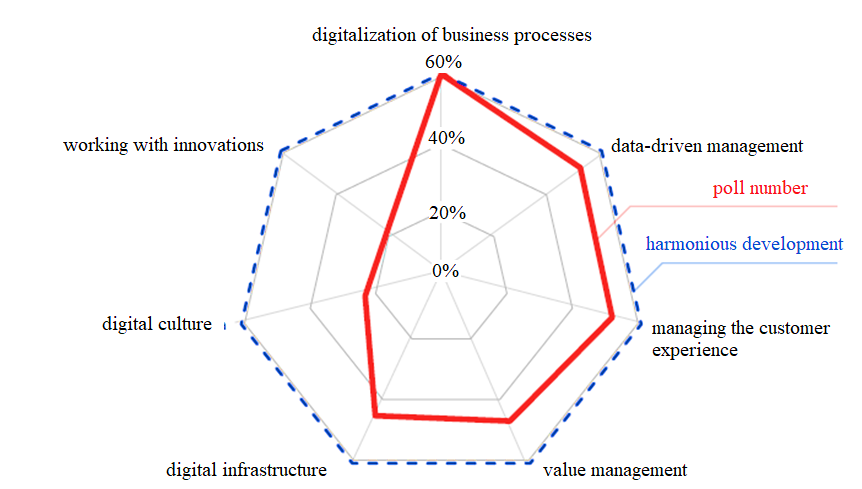
Over the past few years, there has been a downward trend in the innovation activity of organizations in the Russian Federation (Goreva, 2020). For example, in 2018, innovation activity decreased by 1.8%, in 2019 by 3.7% (Figure 2). This trend is an alarming indicator of the loss of interest of the business sector in innovative development within their industries and, in the future, may lead to a general decrease in the country's competitiveness at the global level in the current conditions of digital transformation and the transition to a digital economy.
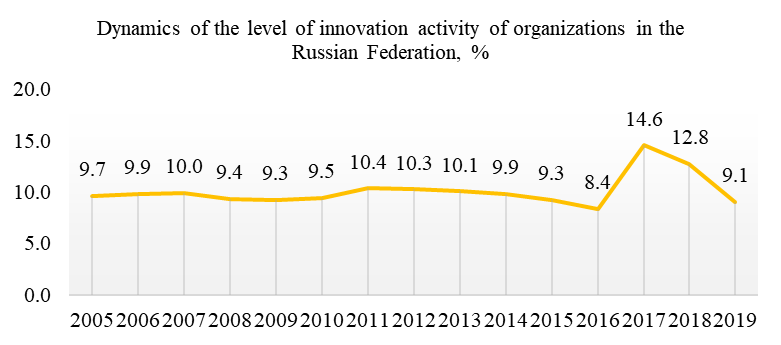
At the same time, there is also a decrease in the share of internal costs of enterprises in the Russian Federation for innovative research and development (Figure 3). In 2009 the share was 25% in relation to GDP (Gerashchenko, 2020). Since 2010 there has been a steady downward trend: over the past decade, the average share of internal expenditures on R&D does not exceed 6%, which indicates a decrease in the interest of enterprises in carrying out high-risk research and design work.
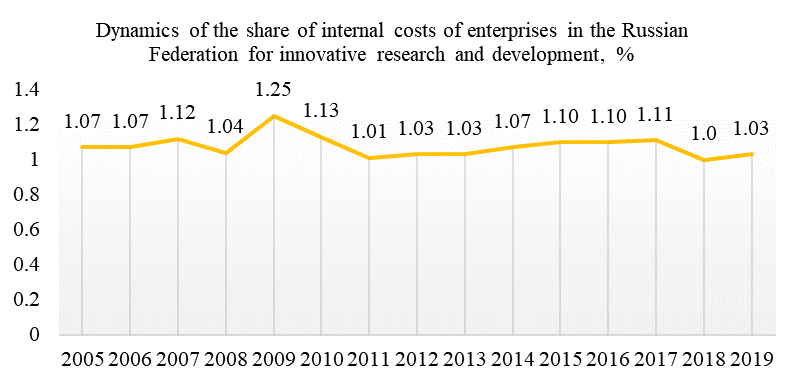
In addition, the level of inventive activity in the Russian Federation also shows a downward trend (Babayan, 2020) (Figure 4), while over the past 5 years, the average number of filed patent applications for inventions was 1.73 units per 10 thousand people of the population.
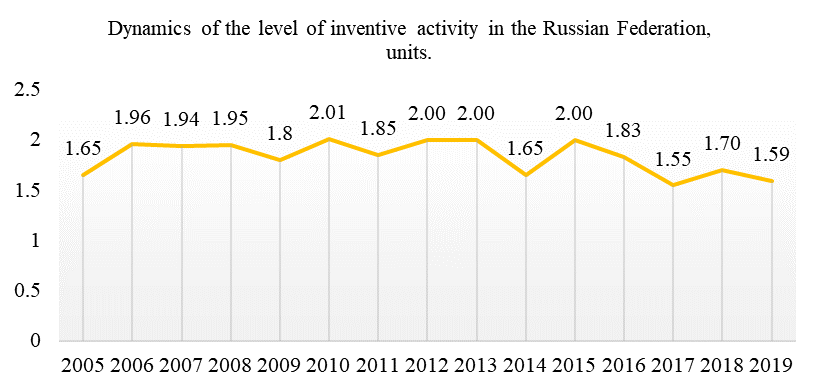
A decrease in the level of the above macroeconomic indicators characterizing the efficiency of the Russian economy indicates a drop in the country's competitiveness as a whole in terms of the development of innovative potential. Enterprises, entrepreneurs and research teams are rightly afraid to engage in the implementation of high-risk innovation projects due to the instability of the external environment and the complexity of adaptation, and therefore the urgency of the transition to an open knowledge management system in order to update the accumulated knowledge and create an environment of open innovation increases.
Basic knowledge management models used in Russian enterprises
Currently, experts identify five main models of knowledge management in Russian companies, each of which reflects the level of exchange of implicit knowledge both within the company and outside it (Table 1).
In the first four models, there is an internal gradation of the openness of the knowledge management system: from the knowledge that a relatively small number of employees participating in a particular project can possess, to the knowledge of all employees working in the enterprise, while the system remains closed to the outside world. The fifth model, despite the limitations associated with the protection of intellectual property, patents for inventions and utility models, etc., does not limit knowledge to the walls of the corporate archive and closed IT systems, most of them exist outside the enterprise, in the external network of experts. Analysis of various approaches to the management of intellectual capital (Kruglov, 2018) shows that recently employees with certain communicative competencies are more and more appreciated, which allow, through establishing contacts, to find the necessary information to solve emerging problems from external sources - experts who are not directly related to the company, in other words, the intellectual capital of modern companies is determined by social capital.
Theoretical aspects of digital corporate culture, comparative analysis of analog (traditional) and digital corporate culture
Any organization develops through its employees, labor system and its consumers, and the corporate culture itself is considered an important part of doing business. This can be called an analogue (traditional) corporate culture that is inherited in many enterprises.
In the process of digital transformation of enterprises, a significantly new concept appears as a digital corporate culture, which is necessary for the successful development of an enterprise during digital transformation. “Digital culture is a set of principles and competencies that characterize the predominant use of information and communication digital technologies for community interaction and solving problems in professional activities” (Ryzhkov, 2019, par. 1). Table 2 shows the differences between analog (traditional) and digital corporate culture in terms of their characteristics.
Based on Table 2, specific elements of digital corporate culture were identified:
- Encouraging employees to openly interact not only with the internal, but also with the external environment;
- Speed of decision-making, focus on results (employees of the enterprise are empowered, delegation of authority), implementation of innovations;
- Supporting the activities of employees in the development of an innovative climate;
- Flexibility and adaptability, the ability to work in a team and the exchange of information between departments and divisions, close cooperation, fast processing and transfer of a large amount of information.
Findings
Based on the above, a design for the digital transformation of an enterprise was developed through the prism of the knowledge management system and corporate culture (Figure 4).
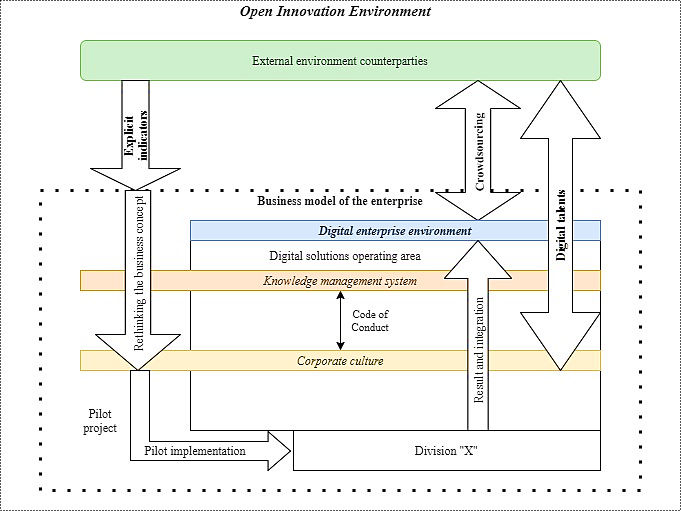
The basic principle of the developed diagram is the principle of accessibility and open data.
Thanks to the counterparties of the external environment, top management receives specific indicators characterizing the current performance of activities, based on data obtained not only in their own, but also in related industries, individual indicators, the results of the activities of analytical departments that provide reports with specific results of activities, etc., and, as a consequence, deterioration of the competitive sectoral position in the market (in the diagram “Explicit indicators").
The basis for determining the need to initiate changes is the personal qualities of top managers: the ability to creatively approach entrepreneurial activity, openness to innovations, adequate perception of the current position of the enterprise in the market. An effective combination of personal and professional qualities leads to a rethinking of the business concept (in the diagram “Redefining the concept of business”).
The result of rethinking the business concept is the creating of a roadmap for digital transformation (Gileva, 2019) in the form of a pilot project for a specific division of the enterprise and its implementation (in the diagram “Pilot project”, “Pilot implementation”, “Division “X”). A division in which the perception of digital transformation is adequate and promising is selected as a pilot (See Figure 5).
Collecting the results of the pilot implementation allows taking into account the difficulties that have arisen, developing an action plan to minimize or eliminate them. Gradually extend the proven plan to the entire enterprise (in the diagram “Result and Integration”).
The implementation of the digital transformation project makes it possible to form the digital environment of the enterprise at the expense of the digital solutions operation zone. It is a special zone, the functioning of which is based on the integration of digital technologies into the enterprise knowledge management system and corporate culture (in the diagram “Digital environment of the enterprise”, “Digital solutions operation zone”). The operation of digital solutions triggers a locally-driven, proactive adaptation process at an early stage and the development of a digital code of conduct (“Code of Conduct” in the diagram) based on a knowledge management system that provides horizontal interaction and information exchange.
Thus, the formation of the digital environment of the enterprise requires the transformation of the business model in order to involve in the environment of open innovation (a business model based on crowdsourcing). That is, on the widespread exchange of knowledge between stakeholders in order to create innovative products that meet the needs of consumers, and obtain positive both economic and social effect (in the diagram “Crowdsourcing”).
The formed crowdsourcing business model will allow attracting digital talents (in the diagram “Digital talents”) due to the attractive digital environment of the enterprise, focused on harmonious interaction with external counterparties, which will raise the competence potential of the enterprise to a new level and ensure long-term competitiveness.
Conclusion
The conducted studies confirm the interconnection of digital transformation of key elements: the business model of an enterprise, knowledge management systems and corporate culture.
The analysis of statistical sources showed that the innovation system of the enterprise is closed and not able to use the innovative potential of both its own and related industries. Therefore, a digital transformation of key elements is needed, which will ensure integration into the open innovation environment.
The intellectual capital of the enterprise in the knowledge management system should perform not only an internal function, but also an external one, related to the search for information to solve strategic tasks.
Digital transformation also requires the development of a new corporate culture, which differs from the traditional way of organizing and forming values.
The transition to an open innovation system implements the approach to the enterprise as an “innovation factory”, due to the possibility of growing digital talents within the enterprise and using and attracting digital talents from outside.
References
Babayan, М. (2020, June 29). Efficiency of the Russian economy. Federal State Statistics Service: https://rosstat.gov.ru/folder/11186
Department, Statista Research. (2020, April 20). Leading countries in Industry 4.0 worldwide as of 2016. STATISTA: https://www.statista.com/statistics/667634/leading-countires-industry-40-worldwide/
Gerashchenko, О. (2020, August 31). Efficiency of the Russian economy. Federal State Statistics Service: https://rosstat.gov.ru/folder/11186
Gileva, Т. A. (2019). Enterprise digital maturity: assessment and management methods. USPTU Bulletin. Science, education, economics. Series: Economics, 27(1), 38-52. DOI:
Goreva, E. (2020, August 31). Efficiency of the Russian economy. Federal State Statistics Service: https://rosstat.gov.ru/folder/11186
IC Insights. (2020, May 12). Global electronic system market CAGRs by category 2017-2021. STATISTA: https://www.statista.com/statistics/783608/worldwide-electronic-system-cagr-by-category/
Ilyin, I. V., Svetunkov, S. G., Kalyazina, S. E., & Bagaeva, I. V. (2019). The main trends in the digital transformation of Russian business. Science and business: ways of development, 97(7), 137-143. https://www.elibrary.ru/item.asp?id=41191651
IoT Analytics. (2021, February 4). IoT: enterprise projects breakdown worldwide 2018-2020, by area. STATISTA: https://www.statista.com/statistics/869335/world-internet-of-things-projects-by-segment-enterprise/
Kruglov, А. А. (2018). Approaches to implementing knowledge management. Young Scientist, 211(25), 75-76. https://moluch.ru/archive/211/51754/
Nestik, Т. (2014, January, 8). Knowledge management models in Russian organizations: a socio-psychological analysis. Modern control technologies, 37(1). https://sovman.ru/article/3705/
PWC Russia. (2018). PWC Russia. Retrieved from Digital champions. Global Digital Operations Research in 2018. https://www.pwc.ru/ru/iot/digital-champions.pdf
Ryzhkov, V. (2019, March 22). What is digital culture? Team-А KMDA: https://komanda-a.pro/blog/digital_culture
Team-А. (2020). Digital transformation in Russia - 2020. KMDA Team-А: https://komanda-a.pro/projects/dtr_2020
Copyright information

This work is licensed under a Creative Commons Attribution-NonCommercial-NoDerivatives 4.0 International License.
About this article
Publication Date
25 September 2021
Article Doi
eBook ISBN
978-1-80296-115-7
Publisher
European Publisher
Volume
116
Print ISBN (optional)
-
Edition Number
1st Edition
Pages
1-2895
Subjects
Economics, social trends, sustainability, modern society, behavioural sciences, education
Cite this article as:
Korshunova, E. D., Astafeva, A. A., Okorakova, A. A., & Guseva, A. V. (2021). Digital Transformation Of The Enterprise: Business Model, Knowledge Management System, Corporate Culture. In I. V. Kovalev, A. A. Voroshilova, & A. S. Budagov (Eds.), Economic and Social Trends for Sustainability of Modern Society (ICEST-II 2021), vol 116. European Proceedings of Social and Behavioural Sciences (pp. 1959-1969). European Publisher. https://doi.org/10.15405/epsbs.2021.09.02.220

